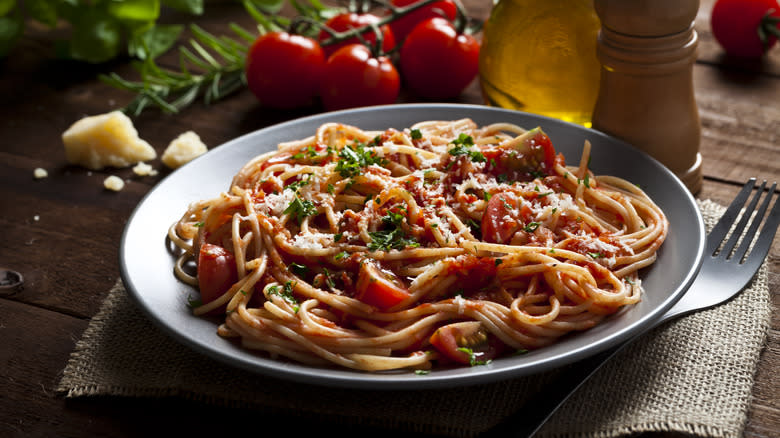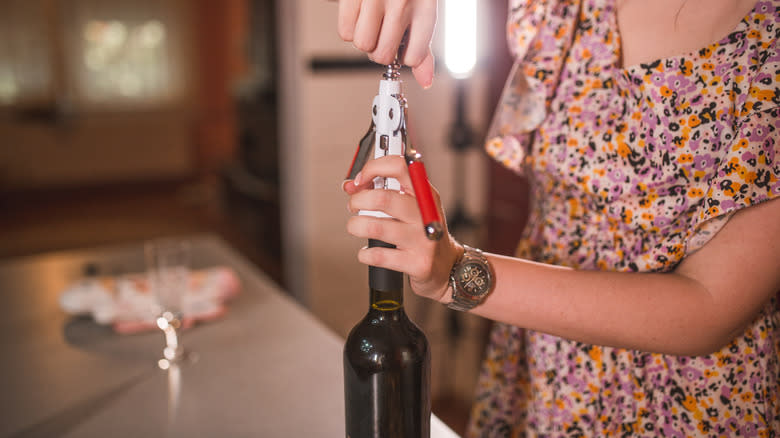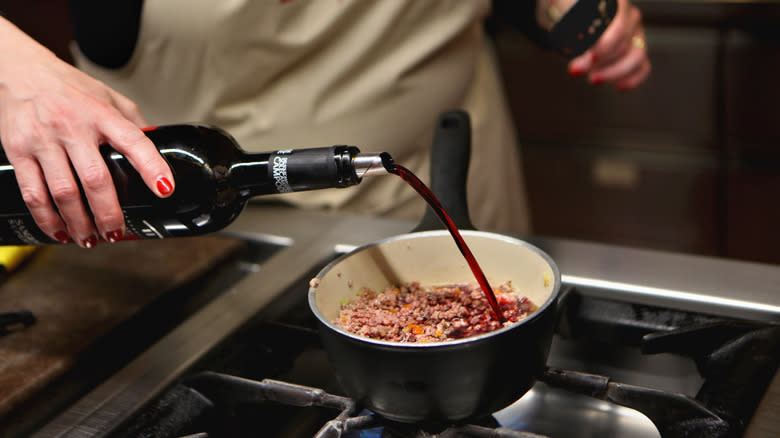The Cooking Liquid Tip For Supremely Flavorful Pasta

Among the many comfort foods that bring joy and solace, pasta is a foodie's best friend. Starchy, saucy, aromatic, and satiating to boot, there's nothing not to love about a heaping plate of noodles. But if you've ever made pasta at home, you may have found that your sauce just doesn't boast as much flavor as the linguini at your favorite local Italian restaurant. If you're struggling to achieve vibrant flavors in your go-to recipe, here's a tip: Wine is the solution.
For starters, wine brings complex, interconnecting flavor profiles to your pasta dish that it might not have otherwise. And because the alcohol content evaporates during the cooking process, what's left is a subtle yet present tapestry of flavors and aromas that adds a nuanced bouquet of sweet zest, earthy florals, and acidic tang to an otherwise dull dish. It's not just the flavor of the pasta that benefits from wine, either — the texture is impacted, too. As the liquid in wine contributes to the sauce's moisture content, it creates a luxuriously silky texture that doesn't clump and dry out.
Thanks to its natural acidity, wine is also an excellent tool for re-shaping and balancing a pasta sauce that's been made too rich from excessive butter or cream. Finally, it can also help deglaze the browned bits of sauteed meat and aromatics that stick to the pot, integrating all of their flavors into the final pasta sauce.
Read more: French Cooking Tricks You Need In Your Life
Cooking Wine Versus Drinking Wine

If you're eager to craft wine-kissed pasta for tonight's dinner, first you'll want to consider the differences between drinking wine and cooking wine. For starters, cooking wine has a less dynamic flavor profile than drinking wine and frequently includes salt and other preservatives to extend its shelf life. Although it's technically safe to drink straight, cooking wines aren't recommended for enjoying out of a glass because they're far saltier than the average bottle of wine, which is also why it's often sold next to vinegar and dressings at the supermarket.
Although cooking wine can improve the flavor and texture of your pasta sauce, some foodies and chefs think it best to opt for higher-quality drinking wine to do the trick. As Julia Child once said via the New York Times, "If you do not have a good wine to use, it is far better to omit it, for a poor one can spoil a simple dish and utterly debase a noble one."
If you don't want to break the bank, however, cooking wine might be the best option since it's cheaper than regular wine. However, since you won't actually be drinking it (but rather use it to build your pasta sauce), there are plenty of affordable wines that don't taste as cheap as they cost. Yellowtail, Barefoot, and Trader Joe's Charles Shaw selections are some tasty, affordable alternatives if you want to avoid additives. But if you have nothing else on hand, there's nothing wrong with using cooking wine.
Best Types Of Wine For Specific Pastas

If you're a wine fanatic, you're probably privy to the notion that it comes in many shades and flavors. But, when it comes to cooking pasta, which type of wine is best? For a straightforward rule of thumb, lighter and more delicate pastas benefit from white wines while heavier pastas thrive on red wines.
White, refreshing wines like fruity pinot grigio and buttery chardonnay are excellent options for light or white cream pasta dishes made with seafood or poultry. As for red wines, it's best to avoid varieties with high tannins like tempranillo and shiraz, as they can tarnish the texture and taste you're striving to achieve. Red wines like cabernet and pinot noir work well with heartier, meatier pastas like spaghetti and meatballs or lasagna.
Ultimately, when it comes to selecting a wine to enhance your favorite pasta dish, the choice is yours. Whether you opt for cooking wine, high-quality drinking wine, flavorful convenience store varieties, or a red or white varietal, your pasta will never be the same.
Read the original article on Daily Meal.

